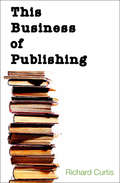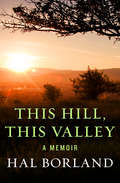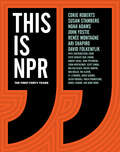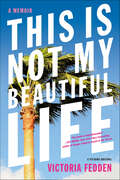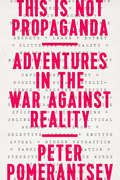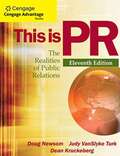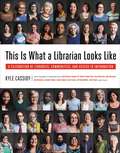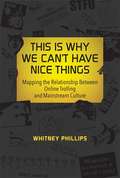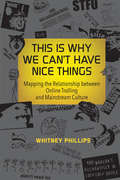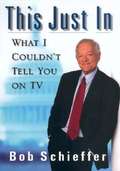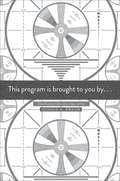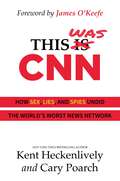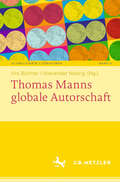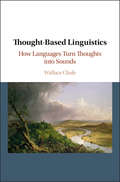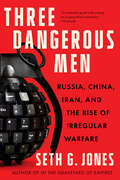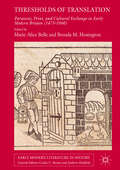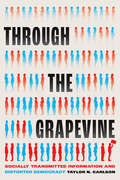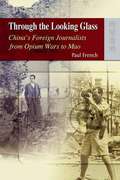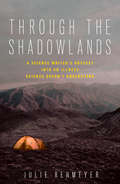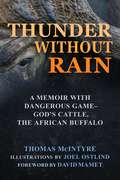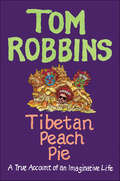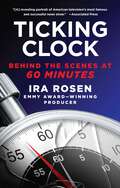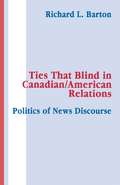- Table View
- List View
This Business of Publishing: An Insider's View Of Current Trends And Tactics
by Richard CurtisThis Business of Publishing has been hailed by literary agent Michael Larsen as &“must reading for writers, agents and anyone else who cares about the future of publishing.&” It reveals the unique perspective of Richard Curtis, former president of the Association of Authors&’ Representatives. He provides the aspiring author with the benefit of over thirty years of lessons learned in the publishing industry, including: the damage caused to the publishing industry by the archaic practice of selling books on consignment; the changing nature of the wholesale business and how it affects authors, editors, and agents; the way that large corporate mergers of publishing companies have brought about the disenfranchisement of authors and editors; and the electronic media revolution and the opportunities it offers, as well as the pitfalls. Curtis talks about the &“blockbuster mentality&” that currently dominates publisher thinking, leading to increased dependence on a few overpaid authors with big-name market status. This is an engaging and thoroughly readable guidebook to one of the most rapidly changing industries in America. It is an essential reference work for anyone hoping to understand or function in the publishing world.
This Hill, This Valley: A Memoir
by Hal BorlandA memoir of a year immersed in nature on a New England farm, by the national bestselling author of The Dog Who Came to Stay. After a nearly fatal bout of appendicitis, Hal Borland decided to leave the city behind and move with his wife to a farmhouse in rural Connecticut. Their new home on one hundred acres inspired Borland to return to nature. In this masterpiece of American nature writing, he describes such wonders as the peace of a sky full of stars, the breathless beauty of blossoming plants, the way rain swishes as it hits a river, and the invigorating renewal brought by the changing seasons. The delights of nature as Borland observes them seem boundless, and his sense of awe is contagious.
This Is NPR: The First Forty Years
by Noah Adams Cokie Roberts David Folkenflik Susan Stamberg Ari Shapiro John Ydstie Renée MontagneA celebration of National Public Radio “full of short histories from familiar names . . . [a] retrospective illustrating just how much they have given us” (Publishers Weekly).“Always put the listener first” has been NPR’s mantra since its inception in 1970, and the result is that its programming attracts tens of millions of listeners every week. This beautifully designed volume chronicles the first forty years of NPR’s storied history, featuring dozens of behind-the-scenes photos, essays, and original reporting by a who’s who of NPR staff and correspondents, and transcripts of memorable interviews. Beyond an entertaining and inspiring tribute to NPR’s remarkable history, this book is an intimate look at the news and stories that have shaped our world, from the people who were on the ground and on the air. With contributions from: Steve Inskeep * Neal Conan * Robert Siegel * Nina Totenberg * Linda Wertheimer * Scott Simon * Melissa Block * P.J. O’Rourke * David Sedaris * Sylvia Poggioli * Ira Flatow * Paula Poundstone * Daniel Schorr * and many more One of Cool Hunter’s Top Five Books of the Year
This Is Not My Beautiful Life: A Memoir
by Victoria FeddenONE OF PUBLISHERS WEEKLY'S TEN MOST ANTICIPATED MEMOIRS OF THE SEASONIF YOU THINK IT SUCKS TO LIVE WITH YOUR PARENTS WHEN YOU’RE THIRTY-SIX AND NINE MONTHS PREGNANT, JUST WAIT TILL THE DEA COMES KNOCKING (WITH THE IRS IN TOW): WELCOME TO VICTORIA FEDDEN’S LIFE.When a squad of federal agents burst through her parents’ front door, Victoria Fedden felt ill-prepared to meet them: She was weeks away from her due date and her T-shirt wasn’t long enough to hide her maternity undies. As for the question of how to raise a child when you’ve just discovered that your mother and stepfather have allegedly masterminded a pump-and-dump scheme? She was pretty sure that wasn’t covered in What to Expect When You’re Expecting—and she really hoped that Bradford Cohen, the noted criminal defense attorney who famously waived his exemption on The Apprentice, would prove them innocent.This Is Not My Beautiful Life is the story of how Victoria lost her parents to prison and nearly lost her mind. No one ever said motherhood would be easy, but as she struggles to change diapers, install car seats, and find the right drop-off line at pre-school—no easy task, when each one is named for a stage in the lifecycle of a f*cking butterfly—she’s also forced to ask herself whether a jump-suit might actually complement her mom’s platinum-blonde extensions and fend off the cast of shady, stranger-than-fiction characters (like the recovering addict who scored a reality show when he started an escort service for women) who populated her parents’ world.A real-life Arrested Development that could only unfold in southern Florida, This Is Not My Beautiful Life is a hilariously funny and unexpectedly moving memoir of a just-functional family you’ll never forget.
This Is Not Propaganda: Adventures in the War Against Reality
by Peter PomerantsevWhen information is a weapon, every opinion is an act of war.We live in a world of influence operations run amok, where dark ads, psyops, hacks, bots, soft facts, ISIS, Putin, trolls, and Trump seek to shape our very reality. In this surreal atmosphere created to disorient us and undermine our sense of truth, we've lost not only our grip on peace and democracy--but our very notion of what those words even mean.Peter Pomerantsev takes us to the front lines of the disinformation age, where he meets Twitter revolutionaries and pop-up populists, "behavioral change" salesmen, Jihadi fanboys, Identitarians, truth cops, and many others. Forty years after his dissident parents were pursued by the KGB, Pomerantsev finds the Kremlin re-emerging as a great propaganda power. His research takes him back to Russia--but the answers he finds there are not what he expected.
This Is PR: The Realities of Public Relations
by Dean Kruckeberg Judy Turk Doug NewsomIdeal for the beginning student or the experienced public relations practitioner, THIS IS PR: THE REALITIES OF PUBLIC RELATIONS, Eleventh Edition, covers the world of public relations with a strong emphasis on fundamentals such as history and research, as well as emerging issues such as technology, ethics, and the international aspects. With numerous examples, strategies, tactics, and case studies, you'll have resources you can take away from the classroom.
This Is Service Design Doing: Applying Service Design Thinking in the Real World
by Marc Stickdorn Jakob Schneider Markus Edgar Hormess Adam LawrenceHow can you establish a customer-centric culture in an organization? This is the first comprehensive book on how to actually do service design to improve the quality and the interaction between service providers and customers. You'll learn specific facilitation guidelines on how to run workshops, perform all of the main service design methods, implement concepts in reality, and embed service design successfully in an organization.Great customer experience needs a common language across disciplines to break down silos within an organization. This book provides a consistent model for accomplishing this and offers hands-on descriptions of every single step, tool, and method used. You'll be able to focus on your customers and iteratively improve their experience.Move from theory to practice and build sustainable business success.
This Is What a Librarian Looks Like: A Celebration of Libraries, Communities, and Access to Information
by Kyle CassidyIn 2014, author and photographer Kyle Cassidy published a photo essay on Slate.com called "This is What A Librarian Looks Like," a montage of portraits and a tribute to librarians. Since then, Cassidy has made it his mission to remind us of how essential librarians and libraries are to our communities. His subjects are men and women of all ages, backgrounds, and personal style-from pink hair and leather jackets to button-downs and blazers. In short, not necessarily what one thinks a librarian looks like. The nearly 220 librarians photographed also share their personal thoughts on what it means to be a librarian. This is What A Librarian Looks Like also includes original essay by some of our most beloved writers, journalists, and commentators including Neil Gaiman, George R.R. Martin, Nancy Pearl, Cory Doctorow, Paula Poundstone, Amanda Palmer, Peter Sagal, Jeff VanderMeer, John Scalzi, Sara Farizan, Amy Dickinson, and others. Cassidy also profiles a handful of especially influential librarians and libraries.
This Is Why We Can't Have Nice Things
by Whitney PhillipsInternet trolls live to upset as many people as possible, using all the technical and psychological tools at their disposal. They gleefully whip the media into a frenzy over a fake teen drug crisis; they post offensive messages on Facebook memorial pages, traumatizing grief-stricken friends and family; they use unabashedly racist language and images. They take pleasure in ruining a complete stranger's day and find amusement in their victim's anguish. In short, trolling is the obstacle to a kinder, gentler Internet. To quote a famous Internet meme, trolling is why we can't have nice things online. Or at least that's what we have been led to believe. In this provocative book, Whitney Phillips argues that trolling, widely condemned as obscene and deviant, actually fits comfortably within the contemporary media landscape. Trolling may be obscene, but, Phillips argues, it isn't all that deviant. Trolls' actions are born of and fueled by culturally sanctioned impulses -- which are just as damaging as the trolls' most disruptive behaviors. Phillips describes, for example, the relationship between trolling and sensationalist corporate media -- pointing out that for trolls, exploitation is a leisure activity; for media, it's a business strategy. She shows how trolls, "the grimacing poster children for a socially networked world," align with social media. And she documents how trolls, in addition to parroting media tropes, also offer a grotesque pantomime of dominant cultural tropes, including gendered notions of dominance and success and an ideology of entitlement. We don't just have a trolling problem, Phillips argues; we have a culture problem. This Is Why We Can't Have Nice Things isn't only about trolls; it's about a culture in which trolls thrive.
This Is Why We Can't Have Nice Things: Mapping the Relationship between Online Trolling and Mainstream Culture (The\mit Press Ser.)
by Whitney PhillipsWhy the troll problem is actually a culture problem: how online trolling fits comfortably within today's media landscape.Internet trolls live to upset as many people as possible, using all the technical and psychological tools at their disposal. They gleefully whip the media into a frenzy over a fake teen drug crisis; they post offensive messages on Facebook memorial pages, traumatizing grief-stricken friends and family; they use unabashedly racist language and images. They take pleasure in ruining a complete stranger's day and find amusement in their victim's anguish. In short, trolling is the obstacle to a kinder, gentler Internet. To quote a famous Internet meme, trolling is why we can't have nice things online. Or at least that's what we have been led to believe. In this provocative book, Whitney Phillips argues that trolling, widely condemned as obscene and deviant, actually fits comfortably within the contemporary media landscape. Trolling may be obscene, but, Phillips argues, it isn't all that deviant. Trolls' actions are born of and fueled by culturally sanctioned impulses—which are just as damaging as the trolls' most disruptive behaviors. Phillips describes, for example, the relationship between trolling and sensationalist corporate media—pointing out that for trolls, exploitation is a leisure activity; for media, it's a business strategy. She shows how trolls, “the grimacing poster children for a socially networked world,” align with social media. And she documents how trolls, in addition to parroting media tropes, also offer a grotesque pantomime of dominant cultural tropes, including gendered notions of dominance and success and an ideology of entitlement. We don't just have a trolling problem, Phillips argues; we have a culture problem. This Is Why We Can't Have Nice Things isn't only about trolls; it's about a culture in which trolls thrive.
This Just In: What I couldn't Tell You On TV
by Bob SchiefferFrom Publishers Weekly It might not have occurred to anyone to clamor for longtime CBS reporter Schieffer's memoir, but now that it's in print, it makes for a highly engaging read. He's seen it all and has much wisdom about journalism and governance to impart. The book spans virtually every important domestic story of the past 40-odd years; among his captivating subjects are the 1962 integration of the University of Alabama, JFK's assassination, Vietnam, Nixon-era peace protests and Watergate. The book's emphasis changes subtly from events to personalities when Schieffer takes over Face the Nation. As the subtitle suggests, Schieffer wisely forgoes rehashing familiar tales like Watergate or the Clinton-Lewinsky scandal in favor of revealing the background action that went unreported at the time. He structures the book as a collection of anecdotes, and, unsurprisingly for such a seasoned pro, Schieffer has a sharp eye for intriguing details and an instinct for maintaining the proper focus on his subjects rather than on himself. When he does get personal, he admirably questions his occasional missteps in balancing family and career. The telling is so unfussy, modest and straightforward that it rarely prompts speculation about the juicy bits that he couldn't write in a book. Indeed, the work succeeds not only as America over the past 40 years.
This Program Is Brought to You By...
by Joshua A. BraunJournalism, television, cable, and online media are all evolving rapidly. At the nexus of these volatile industries is a growing group of individuals and firms whose job it is to develop and maintain online distribution channels for television news programming. Their work, and the tensions surrounding it, provide a fulcrum from which to pry analytically at some of the largest shifts within our media landscape. Based on fieldwork and interviews with different teams and organizations within MSNBC, this multi-disciplinary work is unique in its focus on distribution, which is rapidly becoming as central as production, to media work.
This Was CNN: How Sex, Lies, and Spies Undid the World's Worst News Network
by Kent Heckenlively Cary PoarchA CNN insider reveals what he saw behind the scenes at the cable news giant and the investigation that revealed even more shocking secrets.Cary Poarch started working at CNN in the summer of 2017 as a die-hard Bernie Sanders supporter. But on his first location shoot during the Charlottesville riots, he quickly became disillusioned with how the network created the &“fine people&” hoax. This began a political odyssey as he documented numerous incidents of outright bias, eventually leading him to contact James O&’Keefe of Project Veritas. For months, Cary Poarch documented CNN&’s rampant political bias for Project Veritas, and saw how the network was dividing the country. When the story was released by Project Veritas, it was seen by millions. This book continues his investigation and uncovers even more shocking information about the behavior of network personnel, CNN&’s ties to the Biden White House, CNN&’s creation of a terrifying digital warfare capacity, and the possible penetration of CNN by our own intelligence agencies. Cary partnered with two time New York Times bestselling author, Kent Heckenlively, and together they uncovered even more shocking secrets about &“the most trusted name in news.
Thomas Manns globale Autorschaft (Globalisierte Literaturen. Theorie und Geschichte transnationaler Buchkultur / Globalized Literatures. Theory and History of Transnational Book Culture #6)
by Urs Büttner Alexander NebrigThomas Mann ist bekannt für die enge Verknüpfung seines Werks und seiner Selbstinszenierung mit Deutschland, seiner Kultur und Literatur. Weniger beachtet wurde hingegen, dass er diese Bezüge zunehmend in einen internationalen Kontext stellte und gezielt seine Karriere über nationale und sprachliche Grenzen hinaus vorantrieb, zumal im amerikanischen Exil. Dieser Band verfolgt die Herausbildung von Thomas Manns globaler Autorschaft genauer. Die Beiträge untersuchen, wie er die Erfahrungen von Globalisierung und Deglobalisierung in seinen Schriften reflektiert und welche poetischen Strategien er dazu einsetzt. Weitere Aufsätze beleuchten seinen Versuch, sich in den Kanon der Weltliteratur und in eine globale Literaturgeschichte einzuschreiben.
Thought-Based Linguistics: How Languages Turn Thoughts into Sounds
by Wallace ChafeThe extent to which language is inseparable from thought has long been a major subject of debate across linguistics, psychology, philosophy, and other disciplines. In this study, Wallace Chafe presents a thought-based theory of language that goes beyond traditional views that semantics, syntax, and sounds are sufficient to account for language design. Language begins with thoughts in the mind of a speaker and ends by affecting thoughts in the mind of a listener. This obvious observation is seldom incorporated in descriptions of language design for two major reasons. First, the role of thought is usually usurped by semantics. But semantic structures are imposed on thought by languages and differ from one language to another. Second, thought does not lend itself to familiar methods of linguistic analysis. Chafe suggests ways of describing thoughts, traces the path languages follow from thoughts to sounds, and explores ways in which thoughts are oriented in time, memory, imagination, reality, and emotions.
Three Dangerous Men: Russia, China, Iran And The Rise Of Irregular Warfare
by Seth G. JonesHow three key figures in Moscow, Beijing, and Tehran built ruthless irregular warfare campaigns that are eroding American power. In Three Dangerous Men, defense expert Seth Jones argues that the US is woefully unprepared for the future of global competition. While America has focused on building fighter jets, missiles, and conventional warfighting capabilities, its three principal rivals—Russia, Iran, and China—have increasingly adopted irregular warfare: cyber attacks, the use of proxy forces, propaganda, espionage, and disinformation to undermine American power. Jones profiles three pioneers of irregular warfare in Moscow, Beijing, and Tehran who adapted American techniques and made huge gains without waging traditional warfare: Russian Chief of Staff Valery Gerasimov; the deceased Iranian Major General Qassem Soleimani; and vice chairman of China’s Central Military Commission Zhang Youxia. Each has spent his career studying American power and devised techniques to avoid a conventional or nuclear war with the US. Gerasimov helped oversee a resurgence of Russian irregular warfare, which included attempts to undermine the 2016 and 2020 US presidential elections and the SolarWinds cyber attack. Soleimani was so effective in expanding Iranian power in the Middle East that Washington targeted him for assassination. Zhang Youxia presents the most alarming challenge because China has more power and potential at its disposal. Drawing on interviews with dozens of US military, diplomatic, and intelligence officials, as well as hundreds of documents translated from Russian, Farsi, and Mandarin, Jones shows how America’s rivals have bloodied its reputation and seized territory worldwide. Instead of standing up to autocratic regimes, Jones demonstrates that the United States has largely abandoned the kind of information, special operations, intelligence, and economic and diplomatic action that helped win the Cold War. In a powerful conclusion, Jones details the key steps the United States must take to alter how it thinks about—and engages in—competition before it is too late.
Thresholds of Translation: Paratexts, Print, and Cultural Exchange in Early Modern Britain (1473-1660) (Early Modern Literature in History)
by Marie-Alice Belle Brenda M. HosingtonThis volume revisits Genette’s definition of the printed book’s liminal devices, or paratexts, as ‘thresholds of interpretation’ by focussing specifically on translations produced in Britain in the early age of print (1473-1660). At a time when translation played a major role in shaping English and Scottish literary culture, paratexts afforded translators and their printers a privileged space in which to advertise their activities, display their social and ideological affiliations, influence literary tastes, and fashion Britain’s representations of the cultural ‘other’.Written by an international team of scholars of translation and material culture, the ten essays in the volume examine the various material shapes, textual forms, and cultural uses of paratexts as markers (and makers) of cultural exchange in early modern Britain. The collection will be of interest to scholars of early modern translation, print, and literary culture, and, more broadly, to those studying the material and cultural aspects of text production and circulation in early modern Europe.
Through the Grapevine: Socially Transmitted Information and Distorted Democracy (Chicago Studies in American Politics)
by Taylor N. CarlsonAn enlightening examination of what it means when Americans rely on family and friends to stay on top of politics. Accurate information is at the heart of democratic functioning. For decades, researchers interested in how information is disseminated have focused on mass media, but the reality is that many Americans today do not learn about politics from direct engagement with the news. Rather, about one-third of Americans learn chiefly from information shared by their peers in conversation or on social media. How does this socially transmitted information differ from that communicated by traditional media? What are the consequences for political attitudes and behavior? Drawing on evidence from experiments, surveys, and social media, Taylor N. Carlson finds that, as information flows first from the media then person to person, it becomes sparse, more biased, less accurate, and more mobilizing. The result is what Carlson calls distorted democracy. Although socially transmitted information does not necessarily render democracy dysfunctional, Through the Grapevine shows how it contributes to a public that is at once underinformed, polarized, and engaged.
Through the Looking Glass
by Paul FrenchThe convulsive history of foreign journalists in China starts with the newspapers printed in the European Factories of Canton in the 1820s and ends with the Communist revolution in 1949. It also starts with a duel between two editors over the China's future and ends with a fistfight in Shanghai over the revolution.
Through the Shadowlands: A Science Writer's Odyssey into an Illness Science Doesn't Understand
by Julie RehmeyerJulie Rehmeyer felt like she was going to the desert to die.Julie fully expected to be breathing at the end of the trip—but driving into Death Valley felt like giving up, surrendering. She’d spent years battling a mysterious illness so extreme that she often couldn’t turn over in her bed. The top specialists in the world were powerless to help, and research on her disease, chronic fatigue syndrome, was at a near standstill. Having exhausted the plausible ideas, Julie turned to an implausible one. Going against both her instincts and her training as a science journalist and mathematician, she followed the advice of strangers she’d met on the Internet. Their theory—that mold in her home and possessions was making her sick—struck her as wacky pseudoscience. But they had recovered from chronic fatigue syndrome as severe as hers.To test the theory that toxic mold was making her sick, Julie drove into the desert alone, leaving behind everything she owned. She wasn’t even certain she was well enough to take care of herself once she was there. She felt stripped not only of the life she’d known, but any future she could imagine.With only her scientific savvy, investigative journalism skills, and dog, Frances, to rely on, Julie carved out her own path to wellness—and uncovered how shocking scientific neglect and misconduct had forced her and millions of others to go it alone. In stunning prose, she describes how her illness transformed her understanding of science, medicine, and spirituality. Through the Shadowlands brings scientific authority to a misunderstood disease and spins an incredible and compelling story of tenacity, resourcefulness, acceptance, and love.
Thunder Without Rain: A Memoir with Dangerous Game, God's Cattle, The African Buffalo
by Thomas McIntyre&“When you hear thunder without rain–it is the buffalo approaching.&” This line from a Yoruba hunting poem conveys the magnificent power of the African buffalo, also called &“God&’s cattle.&” Hunter and writer Thomas McIntyre has pursued this special animal for the last forty years, and he now shares his expertise in Thunder Without Rain. McIntyre's topics are wide-ranging, from the various species of the African buffalo and their territories to the cultural importance of buffalo and its place among wild bovids. Other material he covers includes:African, European, and American methods for hunting buffaloHistorical explorers as buffalo huntersGreat buffalo hunters, including Theodore Roosevelt, Robert Ruark, Craig Boddington, and Robert JonesErnest Hemingway&’s writing on buffaloCorrect cartridges for hunting African buffaloAnd finally, what makes buffalo so dangerous—and so sought after?After exploring all topics related to the African buffalo, including hunts of his own, McIntyre ends with the fate of modern buffalo hunting, now often guided and for a high price, and the sustainability of this practice. In Thunder Without Rain, McIntyre confronts his obsession with African buffalo and brings the reader along for a fascinating journey.
Tibetan Peach Pie: A True Account of an Imaginative Life
by Tom RobbinsInternationally bestselling novelist and American icon Tom Robbins’ legendary memoir—wild tales of his life and times, both at home and around the globe.Tom Robbins’ warm, wise, and wonderfully weird novels—including Still Life with Woodpecker, Jitterbug Perfume, and Fierce Invalids Home from Hot Climates—provide an entryway into the frontier of his singular imagination. Madcap but sincere, pulsating with strong social and philosophical undercurrents, his irreverent classics have introduced countless readers to natural born hitchhiking cowgirls, born-again monkeys, a philosophizing can of beans, exiled royalty, and problematic redheads.In Tibetan Peach Pie, Robbins turns that unparalleled literary sensibility inward, stitching together stories of his unconventional life, from his Appalachian childhood to his globetrotting adventures —told in his unique voice that combines the sweet and sly, the spiritual and earthy. The grandchild of Baptist preachers, Robbins would become over the course of half a century a poet-interruptus, an air force weatherman, a radio DJ, an art-critic-turned-psychedelic-journeyman, a world-famous novelist, and a counter-culture hero, leading a life as unlikely, magical, and bizarre as those of his quixotic characters.Robbins offers intimate snapshots of Appalachia during the Great Depression, the West Coast during the Sixties psychedelic revolution, international roving before homeland security monitored our travels, and New York publishing when it still relied on trees. Written with the big-hearted comedy and mesmerizing linguistic invention for which he is known, Tibetan Peach Pie is an invitation into the private world of a literary legend.“A rollicking reminiscence of his Appalachian upbringing, his spiral through the psychedelic ’60s, and his unconventional path to literary stardom.” —O, The Oprah Magazine
Ticking Clock: Behind the Scenes at 60 Minutes
by Ira RosenTwo-time Peabody Award-winning writer and producer Ira Rosen reveals the intimate, untold stories of his decades at America’s most iconic news show. It’s a 60 Minutes story on 60 Minutes itself. When producer Ira Rosen walked into the 60 Minutes offices in June 1980, he knew he was about to enter television history. His career catapulted him to the heights of TV journalism, breaking some of the most important stories in TV news. But behind the scenes was a war room of clashing producers, anchors, and the most formidable 60 Minutes figure: legendary correspondent Mike Wallace.Based on decades of access and experience, Ira Rosen takes readers behind closed doors to offer an incisive look at the show that invented TV investigative journalism. With surprising humor, charm, and an eye for colorful detail, Rosen delivers an authoritative account of the unforgettable personalities that battled for prestige, credit, and the desire to scoop everyone else in the game. As Mike Wallace’s top producer, Rosen reveals the interview secrets that made Wallace’s work legendary, and the flaring temper that made him infamous. Later, as senior producer of ABC News Primetime Live and 20/20, Rosen exposes the competitive environment among famous colleagues like Diane Sawyer and Barbara Walters, and the power plays between correspondents Chris Wallace, Anderson Cooper, and Chris Cuomo. A master class in how TV news is made, Rosen shows readers how 60 Minutes puts together a story when sources are explosive, unreliable, and even dangerous. From unearthing shocking revelations from inside the Trump White House, to an outrageous proposition from Ghislaine Maxwell, to interviewing gangsters Joe Bonanno and John Gotti Jr., Ira Rosen was behind the scenes of 60 Minutes' most sensational stories.Highly entertaining, dishy, and unforgettable, Ticking Clock is a never-before-told account of the most successful news show in American history.
Ties That Blind in Canadian/american Relations: The Politics of News Discourse (Routledge Communication Series)
by Richard L. BartonThis volume explores the political impact of journalistic discourse on international -- and especially Canadian/American -- relations. In so doing, it provides a comparative analysis of American and international press accounts of selected Canadian/American issues such as free trade, cruise missile testing, and acid rain. The intention of the book is to enhance understanding of the political significance of journalists' interpretations of Canadian/American affairs, although the communication perspective and method of news analysis of the book are appropriate for the study of the United States' news-mediated relations with other countries. This study also examines the way people negotiate news-mediated political discourse and how that communication process can influence international affairs.
Time To Know Them: A Longitudinal Study of Writing and Learning at the College Level
by Marilyn S. SternglassIn a time of declining resources in institutions of higher education, we grapple with how priorities are to be set for the limited resources available. Most vulnerable are those students labeled underprepared by colleges and universities. Should we argue that the limited resources available ought to be used to support these students through their undergraduate years? And, if we decide that we want to do that, what evidence of their potential for success can we provide that will justify the use of these resources? Through longitudinal research that follows students who have been so labeled over all their college years, we can begin to find answers to these questions. Time to Know Them is the first book that follows the experiences of a group of students over their entire academic experience. No previous studies have brought together the factors incorporated in this study: *examining writing and learning on a true longitudinal basis; *studying a multicultural urban population; *investigating the relationship between writing and learning by examining papers written over time for regularly assigned academic courses across a range of disciplines; and *taking into consideration non-academic factors that influence academic performance such as race, gender, socio-economic status, and ideological orientation. Through interviews twice a semester over six years, the collection of papers written for all courses, observations of instructional settings, and analysis of required institutional tests of writing, the author has been able to pull together a more complete picture of writing and intellectual development over the college years than has previously been available in any study. Students are seen to acquire the ability to handle more complex reasoning tasks as they find themselves in more challenging intellectual settings and where risk-taking and exploration of new ideas are valued. The integration of students' previous life experiences into their academic studies allows them to analyze, critique, modify, and apply their previously held world views to their new learning. These changes are seen to occur over time with instructional settings and support providing key roles in writing development. Personal factors in students' lives present difficulties that require persistence and dedication to overcome. Never before have the complexities of real individual lives as they affect academic performance been so clearly presented.
